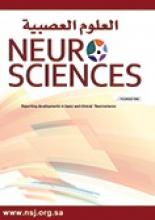Abstract
Drug-induced Parkinsonism must always be suspected when parkinsonian symptom like rigidity, tremor, or postural instability appear in patients receiving drug treatment. Indeed, drug-induced Parkinsonism is a frequent etiology of secondary Parkinsonism. The main causative drugs are antipsychotic, other neuroleptic drugs, and calcium-channel entry blockers. The risk associated with antipsychotics is often dose dependent and related to dopamine D2 striatal occupancy. The risk is less for the second-generation atypical antipsychotic. The other treatments rarely involved are antidepressants, antivirals, anti-arrhythmics, lithium, valproic acid, and others. Regression of symptom will be observed in most cases after a mean delay of 3 months after cessation of treatment. In one-tenth of cases, symptoms persist after drug withdrawal leading to the diagnosis of underlined idiopathic Parkinson's disease.
- Copyright: © Neurosciences
Neurosciences is an Open Access journal and articles published are distributed under the terms of the Creative Commons Attribution-NonCommercial License (CC BY-NC). Readers may copy, distribute, and display the work for non-commercial purposes with the proper citation of the original work.






